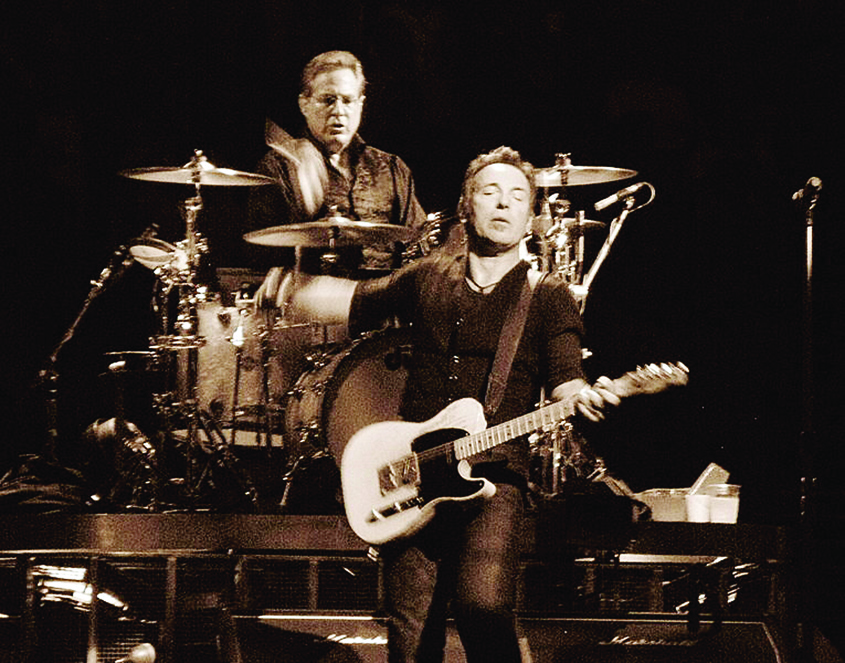Nickleback’s hit track “Rockstar” had us all longing. We have all, at one point of time or another, had that longing — to be a rockstar. And why not? Who doesn’t want to be a celebrity, and have that mass appeal that rockstars are seen to be wielding on the stage at live shows? Who doesn’t want a million people queuing up for hours to catch a glimpse of you, or to see them fighting among themselves to grab hold of that worn-out guitar pick that you threw at them?
It goes without saying that it’s a dream that only a chosen few get a chance to live. Lesser mortals only see it in movies, or read about it in newspapers and books. Born to Run by the arch rockstar Bruce Springsteen is one such book, recounting some of the more memorable episodes from the life of the Boss, as Springsteen was fondly referred to by many of his admirers.
A fruit of some seven year’s labour, the memoir is divided into three sections, namely “Growin’ Up”, “Born to Run” and “Living Proof”, which are all further subdivided into 79 short chapters dealing with different phases in Springsteen’s life, and different aspects to his magnetic personality.
Popular rock-’n’-roll writers will tell you that Springsteen became a muse for journalists, after being featured on the covers of both the Time and Newsweek simultaneously in 1975. This was a tmie when very few people had even heard any of his works. Today, the musician has become a phenomenon. A quick Google search will show you the volumes of books written on him by fans and critics alike. Dozens of documentary films, too, have been made on him. But Born to Run surpasses them all — for it is serves as the word straight from the horse’s mouth.
The book covers the many phases of Springsteen’s early life: the rough and poor childhood he had and the effect television had on his life. In fact, it was not just television but the Ed Sullivan Show that the singer-songwriter was hooked on, and about which he talks on several occasions in this book. Then, watching Elvis on TV made him want to learn to play the guitar.
In the book, Springsteen writes, “The birthing conditions of today’s musicians will be different — just as valid, but different.”
With its short and compressed chapters, the book touches upon some very specific themes. It is highly focus stays on specific topics and anecdotes, revealing in turn the many complex layers of experience that make up Springsteen’s character. But not all is well with this mammoth collection of words. There are several chapters that seem a bit unnecessary, and could have been easily avoided, like the one where he goes on and on about his horses.
“I haven’t been completely fair to my father in my songs,” Springsteen writes, “treating him as an archetype of the neglecting, domineering parent … a way of ‘universalizing’ my childhood experience. Our story is much more complicated.”
The book is bound to take the reader on an emotional rollercoaster with gripping and touching moments in one chapter while a few chuckles here and there in the next few. Like in one of the chapters Springsteen writes: “When you play a bar inches behind the bartender you witness the unfolding of human events from a unique perspective. The formula was always familiar; the timing was all that changed. Woman + booze + man + booze + second man + booze = brawl.”
The most enticing part of the book is the one that deals with the musician’s early years. We are shown how Springsteen as a young kid found the zeal, the zest and the stamina to be the man we know him as today. The bits about his humble beginnings and his Italian-Irish legacy are also very well portrayed. We get to encounter his father, who was an alcoholic and diagnosed at one point with paranoid schizophrenia, as a very intense character in this book.
“I haven’t been completely fair to my father in my songs,” Springsteen writes, “treating him as an archetype of the neglecting, domineering parent … a way of ‘universalizing’ my childhood experience. Our story is much more complicated.”
The most informative and emotional parts of this constant friction between the father and the son are presented really late in the book, as Springsteen talks about his struggles to find some peace and common ground with his father due to the former’s erratic temperament.
The new thing that the book brings to light concerns Springsteen himself. He writes of how he himself has been battling mood disorders and depressive phases in recent years. He mentions that touring was his way of coping with all this, but when he’s not on the road, he says, he just crashes: “When you’re on tour, you’re king, and when you’re home, you’re not.” He even says that had it not been for his psychiatrist, this book wouldn’t have been possible.
If you just read the parts that talk about the Boss’s struggles during his formative years along with the ones about family’s troubles, Born to Run is sure to be one of the most moving autobiographies you’d ever lay your hands on. But reading the entire book — with its 500-plus pages — may just seem a drag. In case you decide to go the whole hog, I’d recommend you put on a Springsteen record in the background to make things a little smoother.

